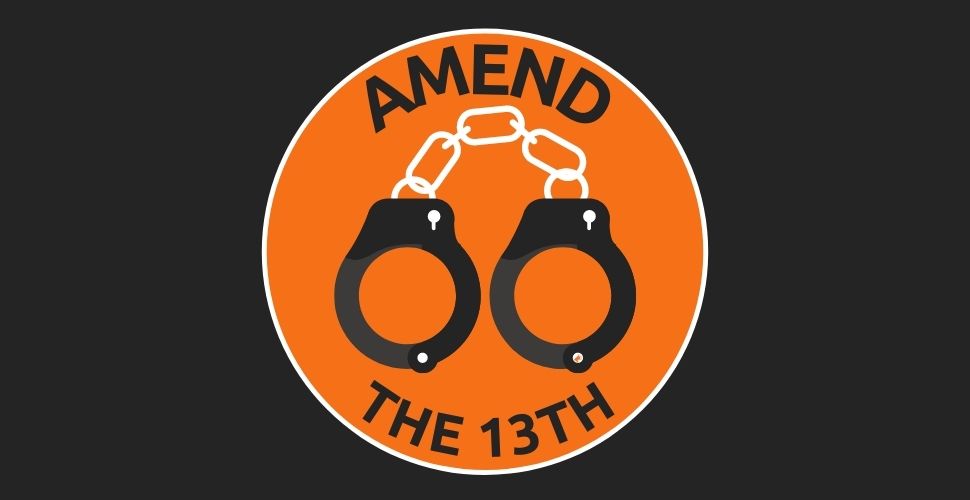Abolish prison slavery in the U.S.

Passed by Congress on January 31, 1865, the 13th Amendment of the US Constitution aimed to abolish slavery, but in reality, the amendment allowed slavery to remain legal.
Section I of the amendment reads:
“Neither slavery nor involuntary servitude, except as a punishment for crime whereof the party shall have been duly convicted, shall exist within the United States, or any place subject to their jurisdiction.”1
Prison slavery is never the answer
The “Exception Clause”, also known as the Punishment Clause, made it possible for slavery to be used as a method of punishment, allowing the government to legally subject people incarcerated across the United States to forced labor. But what is legal is not what is just.
Incarcerated persons exposed to prison slavery or forced prison labor are coerced into working through the loss of privileges, visitations, good time earnings, commissary access or the threat of solitary confinement and even being tasered according to one lawsuit.2
Congress has the chance to end legal slavery
That is why we are asking states and US Congress to abolish the Punishment Clause in state constitutions and amend the 13th Amendment.
The Punishment Clause is not just a glaring fault in the US Constitution — several state constitutions contain identical language. Beginning with Colorado, Utah, and Nebraska, many states are taking aim at striking the Punishment Clause from their state constitutions.
In 2022, Vermont, Alabama, Tennessee and Oregon, through successful Midterm election referenda, have introduced amendments to either remove the punishment clause from their state constitutions or add language to explicitly outlaw slavery or involuntary servitude as punishment for a crime.3
In 2024, voters in Nevada struck down forced labor in the state constitution in the general elections.4
If more states remove the Punishment Clause from their state constitutions, this will create a domino effect for other states to follow their lead, as well as increase the chances of the Abolition Amendment — set to be reintroduced this year — passing through the US Congress.
The forced labor indicators
Forced labor in prisons is often built into “rehabilitation” or “educational” programs. Many who are incarcerated report being threatened with solitary confinement or longer sentences if they refuse to work. On top of this, incarcerated people are often paid nothing at all for their work or mere pennies, leaving them with almost no savings to help them re-enter society upon release.
In 2017, Prison Policy Initiative reported incarcerated people appear to be paid less than they were in 2001. The report stated “What changed? At least seven states appear to have lowered their maximum wages, and South Carolina no longer pays wages for most regular prison jobs – assignments that paid up to $4.80 per day in 2001. With a few rare exceptions, regular prison jobs are still unpaid in Alabama, Arkansas, Florida, Georgia, and Texas.”5
According to the International Labour Organization, under the 1930 Forced Labour Convention No. 29, forced labor is work undertaken involuntarily under threat of menace or penalty. This also applies to prison labor, meaning wages must be comparable to those of free workers with similar skills who are not incarcerated. 6
The Punishment Clause has been a blight on the US for over 100 years, creating an economic incentive for increasing incarceration and exploiting incarcerated people as a source of cheap labor.7 As Senator Merkley, sponsor of the Abolition Amendment, explains, the Punishment Clause created a financial incentive for mass incarceration throughout history, targeting communities of color in particular:
Following the ratification of the 13th Amendment, including the Punishment Clause, in 1865, Southern jurisdictions arrested Black Americans in large numbers for minor crimes, like loitering or vagrancy, codified in new ‘Black Codes,’ which were only applied to Black Americans. The Punishment Clause was then used by sheriffs to lease out imprisoned individuals to work landowners’ fields, which in some cases included the very same plantations where they had been enslaved.
The practice grew in prevalence and scope to the point that, by 1898, 73% of Alabama’s state revenue came from renting out the forced labor of Black Americans. The Punishment Clause’s facilitating and incentivizing of minor crime convictions continued to drive the over–incarceration of Black Americans throughout the Jim Crow era.8
Today prison labor has contributed to the growth of an $80 billion detention industry. America is home to 5% of the world’s total population but is home to 25% of the world’s incarcerated population.
97% of incarcerated people never had a trial. Instead, low-income Americans and people of color in particular, are coerced into plea deals for non-violent offenses.
Join the movement
The United States must reckon with the injustices faced by incarcerated people borne out the Punishment Clause. At the same time, we recognize that this is a first step in tackling the myriad of other state and federal laws excluding incarcerated people from minimum wage and labor rights protection, as well as the need for the public and private sector to divest from facilities that subject incarcerated people to severe labor exploitation.9
Join us in demanding all states and the federal government to explicitly outlaw slavery and involuntary servitude as punishment for a crime in the US and state constitutions — put an end to the Punishment Clause in the United States! You can write directly to your legislature urging them to support the Abolishment Amendment here!
Watch a discussion on this topic here.
Notes:
- https://www.archives.gov/historical-docs/13th-amendment ↩
- https://www.cpr.org/2022/02/15/prisoners-allege-forced-labor-violates-states-anti-slavery-law/ ↩
- https://news.yahoo.com/slavery-forced-prison-labor-ballot-midterm-elections-vote-210923161.html ↩
- https://www.nytimes.com/interactive/2024/11/05/us/elections/results-nevada-question-4-remove-slavery-exception.html ↩
- https://www.prisonpolicy.org/blog/2017/04/10/wages/ ↩
- https://www.ilo.org/empent/areas/business-helpdesk/faqs/WCMS_DOC_ENT_HLP_FL_FAQ_EN/lang–en/index.htm#Q3 ↩
- https://eji.org/news/history-racial-injustice-prison-labor/ ↩
- https://www.merkley.senate.gov/news/press-releases/merkley-clay-propose-constitutional-amendment-to-close-slavery-loophole-in-13th-amendment-2020 ↩
- https://www.freedomunited.org/advocate/end-prison-slavery/ ↩
251,038
-
Laura L.
-
Kimberly W.
-
Edwin D.
-
Follow us on Facebook
5.6M
-
Follow us on Twitter
32K
-
Follow us on Instagram
8K
-
Subscribe to our Youtube
5.7K
Donate